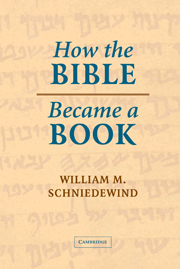Book contents
- Frontmatter
- Contents
- List of Figures
- Preface
- Abbreviations
- 1 How the Bible Became a Book
- 2 The Numinous Power of Writing
- 3 Writing and the State
- 4 Writing in Early Israel
- 5 Hezekiah and the Beginning of Biblical Literature
- 6 Josiah and the Text Revolution
- 7 How the Torah Became a Text
- 8 Writing in Exile
- 9 Scripture in the Shadow of the Temple
- 10 Epilogue
- Suggested Further Reading
- Notes
- Index
4 - Writing in Early Israel
Published online by Cambridge University Press: 16 July 2009
- Frontmatter
- Contents
- List of Figures
- Preface
- Abbreviations
- 1 How the Bible Became a Book
- 2 The Numinous Power of Writing
- 3 Writing and the State
- 4 Writing in Early Israel
- 5 Hezekiah and the Beginning of Biblical Literature
- 6 Josiah and the Text Revolution
- 7 How the Torah Became a Text
- 8 Writing in Exile
- 9 Scripture in the Shadow of the Temple
- 10 Epilogue
- Suggested Further Reading
- Notes
- Index
Summary
Early Israel was an oral society. Biblical literature depicts the early Israelites as semi-nomadic wanderers who finally settled in Canaan and followed a pastoral and later, an increasingly agrarian lifestyle. This was not a setting in which we should expect writing to flourish. Rather, the “literature” of the early Israelites was an oral literature – the songs and stories, proverbs and folktales of a traditional society. The orality of the early Israelite tribes is reflected in biblical literature. According to Deuteronomy, every Israelite confessed about his ancestors: “my father was a wandering Aramean” (Deut 26:5). Archaeological research also has suggested that the early Israelites in Canaan were pastoralists who eventually settled into an agrarian lifestyle. This suggests that the roots of early Israel were semi-nomadic shepherds who lived on the desert fringes of the Near East until around 1300 b.c.e. Consequently, the origins of these wanderers in the archaeological record are obscure. When the early Israelites do begin to show up in the archaeological record, they are shepherds and farmers. But did these shepherds and farmers write books? Who would have read such books anyway? Few, if any, could read. The social infrastructure necessary for the widespread use of writing in Israel would not begin to emerge until the late monarchy. Rather, the beginnings of the Bible are to be found in oral literature – in the stories and songs passed on from one generation to the next.
- Type
- Chapter
- Information
- How the Bible Became a BookThe Textualization of Ancient Israel, pp. 48 - 63Publisher: Cambridge University PressPrint publication year: 2004



